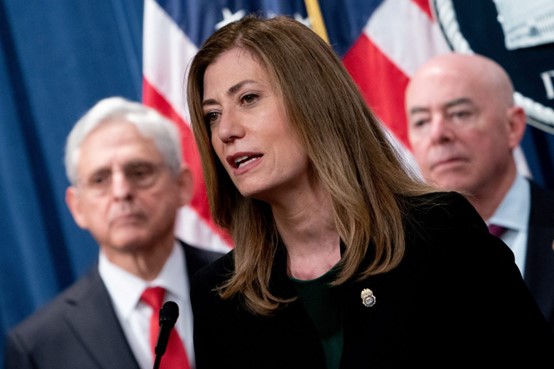
这个侧面印有"生日快乐"字样的白色礼品袋里并没有礼物。据当局指控,里面装着锡那罗亚贩毒集团需要洗白的22.6万美元现金。
美国司法部(U.S. Department of Justice)周二发布了一份涉及多项罪名的起诉书,指控墨西哥锡那罗亚贩毒集团的十几名洛杉矶成员和中国货币经纪人多年来合谋洗白毒资。主要被告埃德加·乔尔·马丁内斯-雷耶斯(Edgar Joel Martinez-Reyes),现年45岁,东洛杉矶居民。迄今为止,这项调查已缴获500万美元现金、300多磅可卡因(合136千克)、92磅甲基苯丙胺(合41.7千克)、3000粒摇头丸和44磅神奇蘑菇(19.9千克)。根据起诉书,被告名单包括"P博士"唐培基(音译,Peiji “Dr. P” Tong)、"Tommy"张赛(音译,Sai “Tommy” Zhang)、"Ocean"何成武(音译,Chengwu “Ocean” He)、劳尔·"蝙蝠侠"·孔特雷拉斯(Raul “Batman” Contreras)、"Edward"何家轩(音译,Jiaxuan “Edward” He)、迭戈·阿科斯塔·奥瓦列(Diego Acosta Ovalle)等人。
首批20名被告将在未来几周内接受提审,如果所有指控罪名成立,每人将面临至少10年监禁,或最高终身监禁的处罚。
美国缉毒署署长安妮·米尔格拉姆在一份声明中说:“贪婪无情和对金钱的追逐是墨西哥贩毒集团的驱动力,他们是美国历史上最严重的毒品危机的罪魁祸首。缉毒署的调查揭露了锡那罗亚贩毒集团与在洛杉矶和中国运作的中国犯罪集团为洗白毒资建立的合作关系。”
美国司法部表示,这个总部设在墨西哥锡那罗亚州的贩毒集团是过去8年芬太尼在美国大量流入(带来了大量现金)的幕后推手。当局说,为了把钱转移到墨西哥,贩毒集团成员求助于中国在美国的货币交易所。据称,大约四年前,马丁内斯-雷耶斯和"P博士"唐培基前往墨西哥签署合同,为贩毒集团的毒品利润洗钱,以换取佣金。
达成协议后,毒贩将现金交给货币经纪人进行洗钱。当局表示,为了掩饰现金,被告使用礼品袋、可重复使用的购物袋、背包、水果味麦片盒和其他物品来藏匿现金。
检察官表示,这些人员购买了加密货币,或以小规模、有组织的方式将钱存入银行账户。起诉书指出,加密货币很容易被转移到锡那罗亚贩毒集团持有的账户中。其他洗钱方法包括购买贵金属和宝石,并将其带到墨西哥出售。
起诉书概述了一个涉及中国货币交易所的复杂计划。美国司法部说,与这些贩毒集团合作的货币交易所还为那些在中国投资并希望将资金转移到美国但被中国政府禁止的中国富人提供帮助。中国的相关规定禁止人们每年向境外转移超过5万美元的资金。
当局说,为了规避这些限制,中国居民会寻求出售美元的经纪人的帮助。经纪人向中国居民提供中国的银行账户信息,并指示他们将人民币存入账户。一旦账户持有人确认存款,就会将等额美元交给美国经纪人。这些经纪人从贩毒集团那里收取现金,并收取总额的0.5%至2%的佣金,以掩盖毒资。(当局表示,传统洗钱者收取的费用远高于中国洗钱者,从5%到10%甚至更高)。
美国司法部表示:“毒贩越来越多地与中国地下货币交易所合作,以利用中国公民对美元的巨大需求。”
起诉书称,这些经纪人要么直接将美元交付给客户,要么购买房产、奢侈品和汽车(运往中国)。当局表示,在中国转移的资金被用于为墨西哥的企业购买消费品或用于制造更多毒品的化学品等物品。
美国国税局刑事调查局局长盖伊·菲科(Guy Ficco)说:"这起案件是中国洗钱者与毒贩合作,试图将毒品活动产生的利润合法化的典型案例。”(财富中文网)
译者:中慧言-王芳
这个侧面印有"生日快乐"字样的白色礼品袋里并没有礼物。据当局指控,里面装着锡那罗亚贩毒集团需要洗白的22.6万美元现金。
美国司法部(U.S. Department of Justice)周二发布了一份涉及多项罪名的起诉书,指控墨西哥锡那罗亚贩毒集团的十几名洛杉矶成员和中国货币经纪人多年来合谋洗白毒资。主要被告埃德加·乔尔·马丁内斯-雷耶斯(Edgar Joel Martinez-Reyes),现年45岁,东洛杉矶居民。迄今为止,这项调查已缴获500万美元现金、300多磅可卡因(合136千克)、92磅甲基苯丙胺(合41.7千克)、3000粒摇头丸和44磅神奇蘑菇(19.9千克)。根据起诉书,被告名单包括"P博士"唐培基(音译,Peiji “Dr. P” Tong)、"Tommy"张赛(音译,Sai “Tommy” Zhang)、"Ocean"何成武(音译,Chengwu “Ocean” He)、劳尔·"蝙蝠侠"·孔特雷拉斯(Raul “Batman” Contreras)、"Edward"何家轩(音译,Jiaxuan “Edward” He)、迭戈·阿科斯塔·奥瓦列(Diego Acosta Ovalle)等人。
首批20名被告将在未来几周内接受提审,如果所有指控罪名成立,每人将面临至少10年监禁,或最高终身监禁的处罚。
美国缉毒署署长安妮·米尔格拉姆在一份声明中说:“贪婪无情和对金钱的追逐是墨西哥贩毒集团的驱动力,他们是美国历史上最严重的毒品危机的罪魁祸首。缉毒署的调查揭露了锡那罗亚贩毒集团与在洛杉矶和中国运作的中国犯罪集团为洗白毒资建立的合作关系。”
美国司法部表示,这个总部设在墨西哥锡那罗亚州的贩毒集团是过去8年芬太尼在美国大量流入(带来了大量现金)的幕后推手。当局说,为了把钱转移到墨西哥,贩毒集团成员求助于中国在美国的货币交易所。据称,大约四年前,马丁内斯-雷耶斯和"P博士"唐培基前往墨西哥签署合同,为贩毒集团的毒品利润洗钱,以换取佣金。
达成协议后,毒贩将现金交给货币经纪人进行洗钱。当局表示,为了掩饰现金,被告使用礼品袋、可重复使用的购物袋、背包、水果味麦片盒和其他物品来藏匿现金。
检察官表示,这些人员购买了加密货币,或以小规模、有组织的方式将钱存入银行账户。起诉书指出,加密货币很容易被转移到锡那罗亚贩毒集团持有的账户中。其他洗钱方法包括购买贵金属和宝石,并将其带到墨西哥出售。
起诉书概述了一个涉及中国货币交易所的复杂计划。美国司法部说,与这些贩毒集团合作的货币交易所还为那些在中国投资并希望将资金转移到美国但被中国政府禁止的中国富人提供帮助。中国的相关规定禁止人们每年向境外转移超过5万美元的资金。
当局说,为了规避这些限制,中国居民会寻求出售美元的经纪人的帮助。经纪人向中国居民提供中国的银行账户信息,并指示他们将人民币存入账户。一旦账户持有人确认存款,就会将等额美元交给美国经纪人。这些经纪人从贩毒集团那里收取现金,并收取总额的0.5%至2%的佣金,以掩盖毒资。(当局表示,传统洗钱者收取的费用远高于中国洗钱者,从5%到10%甚至更高)。
美国司法部表示:“毒贩越来越多地与中国地下货币交易所合作,以利用中国公民对美元的巨大需求。”
起诉书称,这些经纪人要么直接将美元交付给客户,要么购买房产、奢侈品和汽车(运往中国)。当局表示,在中国转移的资金被用于为墨西哥的企业购买消费品或用于制造更多毒品的化学品等物品。
美国国税局刑事调查局局长盖伊·菲科(Guy Ficco)说:"这起案件是中国洗钱者与毒贩合作,试图将毒品活动产生的利润合法化的典型案例。”(财富中文网)
译者:中慧言-王芳
U.S. Drug Enforcement Administration (DEA) Administrator Anne Milgram in 2023.
PHOTO BY STEFANI REYNOLDS / AFP
The white gift bag with a cheery “Happy Birthday” printed on the side didn’t have a present in it. It had $226,000 in cash that the Sinaloa drug cartel needed laundered, authorities allege.
The U.S. Department of Justice on Tuesday announced a multi-count indictment that charged more than a dozen Los Angeles members of the Mexican Sinaloa drug cartel and Chinese currency brokers with conspiring to launder drug money for years. The lead defendant, Edgar Joel Martinez-Reyes, 45, is a resident of East Los Angeles. The investigation so far has yielded $5 million in cash, more than 300 pounds of cocaine, 92 pounds of methamphetamine, 3,000 pills of Ecstasy, and 44 pounds of magic mushrooms. According to the indictment, the list of defendants includes Peiji “Dr. P” Tong, Sai “Tommy” Zhang, Chengwu “Ocean” He, Raul “Batman” Contreras, Jiaxuan “Edward” He, Diego Acosta Ovalle, and others.
The first 20 defendants will be arraigned in the next few weeks and if convicted on all charges, each faces a minimum of 10 years in prison or a maximum penalty of life in prison.
“Relentless greed, the pursuit of money, is what drives the Mexican drug cartels that are responsible for the worst drug crisis in American history,” said DEA Administrator Anne Milgram in a statement. “This DEA investigation uncovered a partnership between Sinaloa Cartel associates and a Chinese criminal syndicate operating in Los Angeles and China to launder drug money.”
The DOJ said the cartel, based in the Sinaloa state of Mexico, has been behind the surging infusion of fentanyl in the U.S. in the past eight years, which drums up hordes of cash. In order to get the money to Mexico, cartel members turned to Chinese money exchanges in the U.S., authorities said. To set it up, Martinez-Reyes and “Dr. P” Tong allegedly went to Mexico roughly four years ago to sign contracts to launder the cartel’s drug profits in exchange for a commission fee.
After the agreement was made, drug dealers laden with cash delivered it to currency brokers for laundering purposes. To disguise the cash, the defendants used gift bags, reusable shopping sacks, backpacks, a box of Fruity Pebbles, and other items to conceal the money, authorities said.
Prosecutors said the couriers bought crypto, or deposited the money into bank accounts in small, structured doses. The indictment states that the cryptocurrency could easily be transferred to accounts held by the Sinaloa Cartel. Other methods of laundering the gains included buying precious metal and gems and taking them to Mexico for sale.
The indictment outlines a complex scheme involving Chinese money exchanges. The currency exchanges that work with the cartels also assist rich Chinese nationals who invest in China and want to transfer their money to the U.S. but are barred by the Chinese government, the DOJ said. Rules in China prohibit people from moving more than $50,000 per year out of the country.
To get around the restrictions, Chinese residents tap brokers who sell U.S. dollars, authorities said. The brokers give the China-based residents bank account details in China with instructions to deposit Chinese currency into an account. Once the account holder confirms the deposit, an equivalent amount of U.S. dollars is given to the U.S. broker. The brokers take cash from the cartels and charge a percentage-based commission fee of about 0.5% to 2% of the total amount to disguise the drug money. (Traditional money launderers charge much higher rates than the Chinese launderers, authorities said, ranging from 5% to 10% or more.)
“Drug traffickers increasingly have partnered with Chinese underground money exchanges to take advantage of the large demand for U.S. dollars from Chinese nationals,” said the DOJ.
The brokers either delivered the U.S. dollars directly to customers or bought property, luxury goods, and cars that they shipped to China, the indictment states. Money transferred in China was used to buy items for businesses in Mexico like consumer goods or chemicals used to make more narcotics, authorities said.
“This case is a prime example of Chinese money launderers working hand in hand with drug traffickers to try to legitimize profits generated by drug activities,” said Guy Ficco, chief of the IRS Criminal Investigation.






